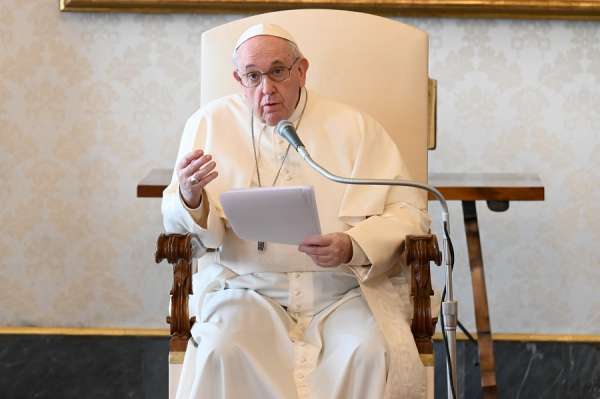Pope Francis: We need unity in the Catholic Church, in society and in nations

In the face of political discord and personal interest, we have an obligation to promote unity, peace and the common good in society and in the Catholic Church, Pope Francis said on Sunday.
“Right now, a politician, even a manager, a bishop, a priest, who doesn't have the ability to say 'we' is not up to par. "We", the common good of all, must prevail. Unity is greater than conflict, ”the pope said in an interview aired on Tg5 on 10 January.
"Conflicts are necessary, but right now they have to go on vacation", he continued, stressing that people have a right to different points of view and "political struggle is a noble thing", but "what matters is intention to help the country grow. "
"If politicians emphasize self-interest more than common interest, they ruin things," Francis said. “The unity of the country, the Church and society must be emphasized”.
The papal interview took place after the assault on the US Capitol on January 6 by pro-Donald Trump protesters, as Congress was certifying the results of the presidential elections.
Francis said in a video clip from the interview, released on January 9, that he was "amazed" by the news, because the United States is "such a disciplined people in democracy, right?"
"Something's not working," continued Francis. With “people who take a path against the community, against democracy, against the common good. Thank God this broke out and that there was a chance to see it well so you can now try to heal it. "
In the interview, Pope Francis also commented on society's tendency to discard anyone who is not "productive" for society, especially the sick, the elderly and the unborn.
Abortion, he said, is not primarily a religious issue, but a scientific and human one. "The problem of death is not a religious problem, attention: it is a human, pre-religious problem, it is a problem of human ethics," he said. "Then religions follow him, but it is a problem that even an atheist must solve in his conscience".
The pope said to ask two things from the person who questions him about abortion: "Do I have the right to do it?" and "is it right to cancel a human life to solve a problem, some problem?"
The first question can be answered scientifically, he said, stressing that by the third or fourth week of gestation, "there are all the organs of the new human being in the womb of the mother, it is a human life".
Taking a human life is no good, he said. “Is it okay to hire a hitman to solve a problem? One that kills human life? "
Francis condemned the attitude of the “throwaway culture”: “Children do not produce and are discarded. Discard the elderly: the elderly do not produce and are discarded. Discard the sick or hasten death when it is terminal. Discard it so that it is more comfortable for us and does not bring us so many problems. "
He also talked about the rejection of migrants: "people who drowned in the Mediterranean because they were not allowed to come, [this] weighs heavily on our conscience ... How to deal with [immigration] later, this is another problem that states they have to approach it carefully and wisely, but letting [migrants] drown to solve a problem later is wrong. Nobody does it intentionally, it is true, but if you don't put in the emergency vehicles it is a problem. There is no intention but there is intention, ”he said.
Encouraging people to avoid selfishness in general, Pope Francis recalled several serious issues affecting the world today, most notably the war and the lack of education and food for children, which have continued throughout the COVID-19 pandemic. .
"They are serious problems and these are just two of the problems: children and wars," he said. “We have to become aware of this tragedy in the world, it's not all a party. To get out of this crisis head on and in a better way, we must be realistic “.
When asked how his life changed during the coronavirus pandemic, Pope Francis admitted that at first he felt like he was "in a cage".
“But then I calmed down, I took life as it comes. Pray more, talk more, use the phone more, take some meetings to solve problems, ”he explained.
Papal trips to Papua New Guinea and Indonesia were canceled in 2020. In March of this year, Pope Francis is scheduled to travel to Iraq. He said: “Now I don't know if the next trip to Iraq will take place, but life has changed. Yes, life has changed. Closed. But the Lord always helps us all “.
The Vatican will begin administering the COVID-19 vaccine to its residents and employees next week, and Pope Francis said he had "booked" his appointment to receive it.
“I believe that, ethically, everyone must get the vaccine. It is an ethical option because it concerns your life but also that of others, ”he said.
Recalling the introduction of the polio vaccine and other common childhood vaccinations, he said: “I don't understand why some say this could be a dangerous vaccine. If doctors present it to you as something that can be fine and has no particular dangers, why not take it? "